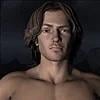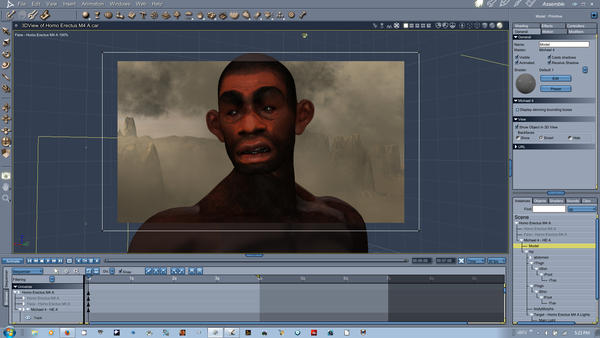DCG - Plugins Fun Discussion
 Dartanbeck
Posts: 21,723
Dartanbeck
Posts: 21,723
A while back, a good Carrara friend of mine bought for me three fine products from DCG (Digital Carvers Guild), maker of fine plugins for enhancing Carrara and LightWave, and I've found scarce little time to actually experiment with them - always meaning to get back and try them out. Well, you know how that may have turned out: Good intentions led to just continuing on in my usual, comfort zone of creating and editing shaders in Carrara's wonderful Texture room.
Roygee has a thread going about Bryce Terrains in Carrara and DAZ_Spooky came in saying that Ground Control by DCG allows for direct importing of certain elevation maps into Carrara terrains. I mentioned in there that I really long to buy Terrain Tools, which helps make shaders that detect where objects intersect, so we can make different effects happen at those intersections, like shoreline froth, shallow transparency, etc., and suddenly realized that I already own a bunch of cool features that I've not yet gotten into! Yikes! Do I even deserve Terrain Tools? Would I just let it sit? Time to plug some of these tools into my shaders and check them out!
===============================================================================================
For starters, I started looking through some of the tutorials at the DCG site. Upon checking out the new features that ShaderOps 2's Light Mangler adds to SSS (Subsurface Scattering), I had to try this out! SSS has been a hot topic in the past, why not have a look, eh?
So for my first run, I decided to use one of Mec4D's Homo Erectus, and decided upon the M4 one, for more free real estate of the figure before breaking TOS! LOL
Cat (Mec4D) was kind enough to include a whole slew of maps for us to moonkey around with in the Homo Erectus products, so that's how I decided to begin there. You see, Carrara's SSS channel only allows for a single color chip, and a few controls. Shader Ops 2's Light Mangler changes all of that. In addition to its own new functions, it also adds all other Carrara shader functions to the list of options for SSS, including gradients, values, noises, etc., and I wanted to try using the Texture Maps that Cat made, since she included some for use in the SSS channel.
After a bit of playing around with it, here's my first showing, which is my third try. It's still not right, but I wanted to show my progress before I get too far with this.
Anyone else have some DCG experiences to share?




Comments
To gain these extra functions in this case, I set the Top Shader to "ShaderOps 2 - Light Mangler"
The original shader that I had set up was kept as the top line of the tree, called: "Shader"
A whole pile of new channels now appear, including the new Subsurface Scattering Channel, which allows for any of Carrara's shader functions to be used within it, as well as some new Shader Ops 2 functions as well.
At this point, I have yet to try any of these other new channels - but I will.
To get the above image, I nested together ShaderOps2 - Calculate SSS multiplied by a Color Gradient controlled by Cat's SSS texture map.
I repeated this process through all of the fleshy material zones.
Same scene without Light Mangler on the fleshy shaders
Now to look deeper into this particular effect and see how I can fix it. So far I was just messing around. I'd like to find out how different functions can help to make the SSS really work the way I'd like to see SSS work. As well, I'd like to investigate the rest of these Enhance C, Shader Ops, and Shader Ops 2 features!
For SSS to look the best, it really needs a strong light source. Backlighting is good for showing off the ears and other thin areas. A good side light would show off the spread of light through the skin. A good example would be getting a nice rosy look to the cheeks.
So many times I see SSS make the character look like they're made out of wax. The worse examples I have seen have actually been from unbiased renderers. It is not that the renderers are the issue, but the user probably doesn't know when to dial the settings back. Thankfully, dustrider and joeping are gifted and talented and know what they're doing so I haven't noticed the issue with their renders. I actually began noticing it when Reality came out for Studio and folks were posting their Reality renders.
Just messing around on a plane, I found this cool "Pipes" function in Enhance C
You're right, I'll do some better tests next week with a darker scene and lights that intend to help illustrate what the SSS is doing. It was easy for me to see the difference, being in the driver's seat! LOL
I put the above "pipes" image into Howler 9.5's 3D Designer, exported an obj file of it, and duplicated it in Carrara with a modified "lead" shader
and then what happened?
can you show us some more eggsamples?
Couldn't you just apply that map to the displacement channel directly in Carrara and get pretty much the same result? Actually I just tried that and the result wasn't great, but I tried it by importing the map on a terrain and that looks pretty good - here replicated in a 10x10 autogrid.
hya Dart, I need some sss happening, how about a bit more enlightenment please ?:)
Why not play with Emily ?
http://gl.ict.usc.edu/Research/DigitalEmily2/
She is very simple model with HiRes maps ...
Here are few renders of her in Blender Cycles (unbiased):
http://blenderartists.org/forum/showthread.php?379147-Skin-in-Cycles-Emily-2-1
Good luck
Bookmarked. Thanks.
Well, textures are in EXR format, that can pose problems for some people, however, they can be converted into more suitable image formats with Photoshop or whatever
I post my test to know if anyone had luck with eyes maps: this is what I get using obj, I'm gonna try the abc format
no sss here only a bit of translucency, slightly touched up in post, a 15 min render
last OT, I promise
another close up with a more grazing lighting
If trying to do ultra-realistic humans, I have to say that I never thought that Carrara's native SSS gave that good results. SSS in Octane was a revalation how good it works.
looks great magaremoto!
thank you head wax, in spite of strange artifacts of the provided maps the shader editor works great in carrara and the whole lighting pack available within did all the rest
about sss I think there is a bad understanding of what it can do in carrara: it can turn the soft shadows on arms or neck, for example, into pale red to avoid a doll-like skin effect, but hardly can fire up ears when lit from behind; you can get it when you have a good transparency map (or depth map as well) and play around with translucency, like I did for this ten24 model with likely results
Well, I hardly ever use it because it's slow and outdated (the only thing slower are blurred reflections, that has to be the slowest piece of code ever written).
SSS (as of now) has been in Carrara for a while, it was originally intended for a simple SSS effect (there is no even depth and anisotropy control) and it was never updated ...
Real skin shader, on the other hand is, in general, way too complex to be simulated with Carrara's SSS, for some reason plugin developers are not interested, simply plugging texture maps into existing SSS will not do it for me, I need more
I agree, FifthElement
moreover IMO sss in carrara is more a milkiness or opalescence effect, that are 2 different ways to refract light, good for materials like jade, wax, glue, latex, some minerals etc. but not for skin
the following are the results of a quick test with a transparency map set to 5% and 20% with and without sss
..and this the "latex" effect we get with pure sss and no transparency (or depth) map
this is the final result combining sss and transparency, slightly touched up in post; strange artefatcs due to use of caustics
EDIT: tweaked the caustics to correct the weird reflections on the model, touched up in post